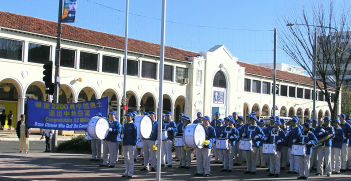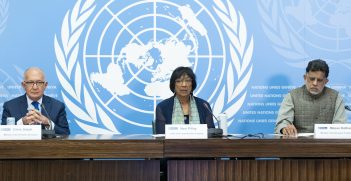Hun Sen’s Glorification of 7 January Must be Rejected

The Cambodian regime’s celebration of the 40th anniversary of the collapse of the Khmer Rouge as “Victory Day” on 7 January is contemptible and must be condemned.
The Cambodian dictatorship’s celebration of Vietnamese occupation represents not only an abominable betrayal of efforts by the international community, but will also bolster this tyrannical regime for generations.
Modern Cambodia was created and recognised by the United Nations in the aftermath of the 1991 Paris Peace Accords (the Accords). The Accords specifically referred to ending the civil conflict and bloodshed between Cambodia and Vietnam.
The Accords brought Cambodia out of communism and led to the regime’s legitimacy being recognised, including through ASEAN membership.
That legacy is now being trashed as Hun Sen’s regime has been on a successful mission to commemorate Vietnam’s invasion when it ousted the Khmer Rouge in 1979.
Prior to the implementation of the Accords, ASEAN and the United Nations condemned Vietnam’s actions against Cambodia as an invasion rather than liberation.
However, a recent study by Steve Heder of London University highlighted the increased level of so-called “military cooperation” between the two nations. With relations between Cambodia and Vietnam reverting to their state during the Cold War, the bigger question for ASEAN is whether the guise of friendship with Cambodia serves only to conceal Vietnam’s expansionist objectives.
The relevant question for ASEAN at present is whether Vietnam has breached one of its golden principles: “non-interference”.
Heder notes, “always at the most difficult times, there has been only Vietnam helping Cambodia”, and that, currently, the Vietnam People’s Army is ready to assist the Royal Cambodian Armed Forces “in all circumstances”, including at any time “when the CPP is encountering difficulties”.
With the opposition banned by Hun Sen’s Supreme Court in November 2017, his regime has used its dictatorial powers to appropriate the widely condemned legacy of Vietnam’s past invasion in Cambodia.
A condemned past legacy – “7 January Victory Day”
As Cambodia celebrated the legacy of the Vietnamese invasion, members of the Cambodian-Australian diaspora in Melbourne and Sydney launched coordinated protests.
In the eastern and southern states of Australia, the event was marked by the attendance of Cambodia’s ambassador, Koy Kuong and some of the regime’s associates who were recently named and shamed by members of the Australian Opposition Labor Party as “criminal and thuggish”.
Had people in Cambodia been given the right to freely express their opinions, the majority would have taken to the streets and protested against Cambodia’s condemned past policy.
In this respect, there is a moral question for Australia and the international community – why should Australia continue to feed impoverished Cambodians in the countryside, thereby absolving Hun Sen of his responsibilities to his own people?
The accords have now been totally abrogated and treated as a “ghost document.” With the international community being assuaged by Hun Sen’s rhetoric of change and internationalised language of “cooperation”, perpetual foreign aid only ensures the survival of his regime.
The latest threat was Hun Sen’s reported use of the “Win-Win” policy last year, shortly before Cambodia’s Supreme Court dissolved the main opposition. Hun Sen had told opposition commune councillors, who numbered over 5000 that they could hold on to their jobs if they defected to the ruling party.
“This is a win-win policy,” he said.
He warned that all those who opposed his proposal “are allies of the Pol Pot regime. If they oppose January 7, they are in alliance with the Khmer Rouge and the genocidal regime.”
But Hun Sen was already part of the Khmer Rouge, and is now a ruthless and merciless dictator who is obsessed with violence. Despite this, the international community continues to engage and cooperate under the false hope that that Hun Sen will change.
For nearly the last 30 years, the transformation of Cambodia into an authoritarian state took place right before the United Nations.
Yet instead of applying pressure for Hun Sen to be accountable, foreign donors including Australia, Japan and the European Union have continued to pour aid into Cambodia for the last 30 years.
The reality is, the celebration of 7 January is a “Win-Win” for Hun Sen and Vietnam.
Hun Sen became dictator for life and passed power on to his family. In turn, Vietnam was able to have its condemned invasion of Cambodia in 1979 glorified and inscribed in monuments built by Hun Sen.
Coercing Cambodians into honouring a “Victory Day”, is no different to forcing them to accept an illegitimate parliament, following a rigged election, an action condemned by 45 countries in March 2018.
In 1996 Hun Sen raised the issue of marking 7 January as Cambodia’s official national holiday with the late King Norodom Sihanouk, who doggedly refused to comply. Instead the late King, unlike the current “compliant and quiet king”, instructed Hun Sen: “In order to avoid some difficult political issues, I am of the view that issuing a circular by the government is better than a Royal decree.”
Instead of changing for the better, Hun Sen’s neo-patrimonialist system is well developed and has even been exported to Australia as the regime seeks to legitimise its “populism amongst educated” and western nations.
Another relevant question is whether Australia and the West should continue to offer student scholarships for overseas-educated Cambodians to return home to serve a dictatorship?
The call for the international community to reject this legacy and the regime is supported in a Joint Statement by 45 countries in March last year, calling; “For the Cambodian Government to retain its legitimacy, any elections must be free, fair and credible”.
Given the regime proceeded with the election in contravention of this declaration, the 45 nations need to act on their words and declare that the regime is neither legitimate nor representative of the Cambodian people.
Sawathey Ek OAM is a lawyer, Principal of E K Lawyers (Sydney) and Spokesperson for the Cambodian Action Group.
This article is published under a Creative Commons Licence and may republished with attribution.





